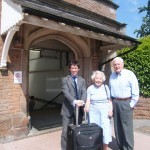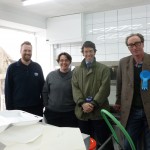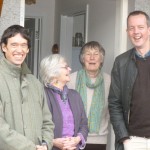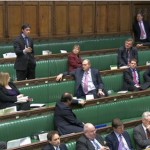william howard school, brampton
I am campaigning hard in support of the Head Teacher and Governors of William Howard School to become an academy, and have used a meeting with Michael Gove to press to make an exception for this fantastic school. The latest Ofsted report in July 2009 reported that the school was ‘good’ in all areas, and achieved a consistent rating of 2 across the board. Exam results continue to improve, and the school, subject to the agreement of their governing board, is anxious to be in a position to consider applying for academy status. The Secretary of State has announced that schools with consistent ratings of ‘good’ but with outstanding features are now eligible to apply. WHS is not in this category. But I am hopeful following my meeting with the Secretary of State, that he will now allow WHS and schools like it to apply. I am confident that all the work and energy of WHS will soon be rewarded by their becoming one of the first academy schools in Penrith and the Border.
new year in cumbria
I spent Christmas with my family. My little sister, who has Down’s Syndrome, made Christmas for us. She spent much of the holiday in a pink, pointed woollen hat, with ear flaps – the kind I imagine a Peruvian wearing. She took my father swimming and me skating (I promptly fell over in the middle of the ice: she didn’t). She took my mother ‘pottering’ – which seemed to mean walking round the post office (I don’t know where she gets the words from). Her delight in presents, the methodical pace at which she opens them, her strong sense of ritual – telling us when we are allowed to eat cake, when to sing carols, her care for cooking – imposed a discipline and tranquility on us all.
I spent the last ten days of the recess, alone, trying to finish some writing, while three hundred miles away the political wheels in London were creaking into action with scandals, open-letters and rumours of reshuffles. I didn’t see anyone on New Year’s Eve but the next afternoon I walked out to Askham, climbing from the ruins by the beck to the pit burials on the fell, turned at the standing stones, and came back along the Roman Road over High Street. Otherwise, I was mostly dealing with correspondence.
Many e-mails protested the actions of powerful companies. Developers were forcing estates into valleys, wind-turbines onto mountains and supermarkets into market towns – against the wishes of communities. The same supermarkets were crushing dairy farmers by paying an incredibly low price for milk. All that is local – from the Penrith Cinema and Wigton’s shops to Newton Rigg – seemed to exist under the shadow of big, national organisations with short attention spans.
The letters and campaigns were almost always compassionate, knowledgeable, and determined. Parishes – or groups of parishes like the Upper Eden Community Plan – displayed an imagination and generosity which would be difficult to simulate in distant offices. And communities care about results: Lyvennet protects its landscape because it loves it; Crosby presses for affordable housing because they need housing for their children. And a hundred brains working together generate remarkable solutions. In Greystoke, in Patterdale, in Mungrisdale, in Alston, in Mallerstang, in Bewcastle and in Morland, communities pressing for broadband – researching, publishing on their website, suggesting new technological and engineering solutions and circumventing legal and financial barriers – are producing solutions which are quicker, smarter and cheaper than any previous government initiative. From Hartley to Penton, lecturers, senior civil servants, lords, farmers, councillors, ex-heads have produced serious and considered proposals for Newton Rigg, without which the site would probably have been closed. It was the communities that saved our community hospitals. And the hundreds who gathered last week to march for the Cinema will – with luck and a great deal of effort – be able to save that too.
But the effort required is immense. In each case communities are taking on giant organisations – public or private – who own the sites, have the financial information, have rigid theories about what should be done. They have out-manoeuvred other communities in the past. Communities must struggle to find out basic information (such as the real size of Newton Rigg’s deficit); study laws and restrictions (such as whether European ‘state-aid’ rules really stop them using public fibre); challenge technological claims (such as how much energy the wind-turbine generates); must relentlessly press officials to act. This is exhausting, risks time and money, and in the process, exposes them to their opponents’ accusations of ignorance and small-mindedness. But if communities are trusted then the compassion, the knowledge and the will-power which they can bring to bear is irresistible.
But the spirit extends further. Last week, I had finished my last Herald article and sat by the fire trying to work out how to defrost my meal (the Aga and the heating had been broken for a week and the electricity had gone off again) when there was a sound like a trapped jackdaw clambering up, slipping down and struggling in the chimney. Then black clods began falling onto the hearth and an acrid smell, like burning yak dung, filled the room. Orange flames appeared behind the mantle-shelf. I pulled off the mantle-shelf – revealing for the first time since 1900 three sepia prints of ladies in Victorian hats, a set of scissors, a penknife and a live pistol round – and poured buckets down the wall.
I was saved by the Shap fire brigade. The firemen had been dragged out of sleep at one in the morning, had located a cottage on a nameless track – which was invisible to any GPS – and then had to abandon their engine and come in half a mile on foot on a narrow icy track in driving rain. But they were as cheerful and calm as though it were a Sunday afternoon picnic. One worked the thermal camera, another pair assembled a pump – which seemed to include a pipe, partly made of Victorian bamboo attached to my watering can. They had the situation under control so quickly that I had nothing to do other than to walk up and down the hill to carry some salt to help their fire-engine off the track. The same combination of compassion, common-sense and energy which we see in communities is often deeply present also in the public sector.
intelligence squared debate
Rory will be speaking in a debate at Cadogan Hall, London, on Thursday March 3rd 2011 at 7pm.
The debate is entitled “Let the bad guys be: David Aaronovitch and Rory Stewart on the perils of foreign interventionism”
Tickets can be purchased directly on the Intelligence Squared website by clicking here.
Or, if you are unable to come, the event will be livestreamed on the same link.
save penrith cinema update
Update on the Lease Situation at the Alhambra:
I spoke to Vince Hughes, one of the directors of Graves, on Friday. He explained in some detail the financial information and the offer he had received, but on a confidential basis. I encouraged him to talk to his Board about sharing information more widely. He expressed interest in principle in the possibility of allowing the community to buy the premises and in giving a fixed period of time in which to come up with an offer. I have just spoken to him again, and he has this morning been given approval by his Board to extend the period of time in which to form a campaign and raise funds to April 30th 2010. He is offering an outright sale of £750,000, however they will not consider a lease. I have written to the Save Penrith Cinema Steering Group with this information.
‘broadband meets localism’ conference
Rory opened the ‘Broadband Meets Localism‘ conference at Carlisle Racecourse on Saturday January 14th with a speech in which he explained how the passion of parishes in Cumbria was ‘completely transforming’ the government’s approach to broadband.
Gathered at the event, organised by the Carlisle Parish Councils Association (CPCA) and Cumbria County Council, were over one hundred community representatives from across Cumbria.
Urging parishes to gather together and help make the £10m grant from BDUK to pilot a super fast broadband network in Cumbria, go further he said: “It is almost impossible to imagine delivering super fast broadband to Cumbrian communities without communities themselves playing a very large part in that roll-out. If communities are prepared to gather together, define their needs, aggregate demand and demonstrate the need for take-up, this can transform what government will and can offer. If communities are prepared to waive wayleave charges, to dig in fibre themselves, to think through the network at a very local level, then they should be able to get broadband to areas commercial carriers will not reach.
In his opening speech Rory, who is also Chairman of the All-Party Parliamentary Group on Town and Parish Councils, appealed to communities to get involved in his campaign: “Already on our website –www.broadbandcumbria.com – we are seeing dozens of parishes and hundreds of members getting involved, exchanging views, mobilising whole areas and discussing parish strategies. We must assume that communities know more and can do more. The basic premise should be: let the parish drive ahead. Let’s create a situation where people want to serve on parish councils – giving them the power, the responsibility and sometimes the financial authority to bring about change.”
alston local shops campaign
Last weekend Rory helped launch a new Alston initiative with Sustainable Alston Moor to promote independent retail in the market town: Alston Moor SOS – Save our Shops and Services. The town’s campaign will encourage local residents to do more of their shopping in the town, which boasts restaurants, cafes, pubs, takeaways, craft and antique shops, a Post Office, garages, plant nurseries, banks and a host of other independent shops and services. Alston has a tradition of co-operative and social enterprises, such as the Moody Baker, the community-run gym Alston Moor Fitness Centre, and arguably Cumbria’s best-known community broadband initiative, Cybermoor.
After his opening speech, on Friday January 14th, Rory met with residents and walked about the town visiting local shops. He said: “I am really excited to be here today. Sustainable Alston Moor and the work it does is such an important model for so many other parts of Cumbria, because of the very similar challenges being faced all over the constituency, from Wigton, to Appleby, to Kirkby Stephen and of course Penrith. There are so many good reasons to shop local, and we need to make sure that we support our shops in every way. We can all see the patterns: the arrival of huge supermarkets, and the detrimental effect of these big monopoly retailers on small producers and on our towns. We have got to do all we can to encourage shoppers to buy local. I hope that Alston SOS can be replicated across the constituency, and wish it a very successful year.”
Bronwen Lewis of Sustainable Alston Moor said: “The campaign was launched in Alston marketplace by Penrith and the Border MP, Rory Stewart. It was important to us to have his support, and to see his evident interest in our community. Rural communities like Alston Moor demonstrate high levels of social enterprise and voluntary community involvement, but we also face very serious challenges in the areas of employment, housing and transport. We need our MP to fight our corner in order to help remote rural communities have a sustainable future!“
Sustainable Alston Moor was set up in 2008 to help Alston Moor make the transition to a low-carbon, sustainable and ethical future. It is now a charitable company limited by guarantee, and hosts public events, runs projects on alternative energy, local food, transport and education, and has over 200 local supporters.
save penrith cinema
Please support our bid to save Penrith’s Lonsdale Alhambra Cinema
The hundreds of protesters, who I joined outside the Cinema on Saturday were amazing. There was real verve, energy and exuberance in the streets. I never thought I’d see so many people (still less end up standing between Darth Vader and Borat).
I love the cinema – and love watching films in it – like so many others. It is a vital element of energy and culture in the center of our town. I have received dozens of emails, letters and phone calls from constituents angry about the proposed closure, and asking for a positive solution. There was a meeting yesterday. We’d like, with the support of local organisations and perhaps also the district council – run the cinema ourselves. I proposed the community buy-out of the cinema in the House of Commons, yesterday, as part of the debate on the localism bill. But if we are to make this work, we need to harness all the energy of hundreds of people together, and plan, push and act.
We are told that the cinema is a profitable enterprise, and clearly it’s a business that really matters. I’d like the council to restrict its function as a cinema, (and not as a pub), get people to contribute, run it as a community asset and make profitable returns. We‘ve seen this approach work elsewhere in the constituency: such as with the Old Crown pub in Hesket Newmarket.
I have written to Graves Cumberland Ltd to find out more detail on the closure, to discoverwhether a new lease, on behalf of the community, is possible and to see if there is anything else we can do.
The rally on Saturday was really well-run, and the energy of everyone who came out in the rain to show their solidarity was extraordinary. Please go to the cinema in the coming weeks. Show how much you enjoy it. Encourage you friends, family, neighbours and colleagues to go. If you haven’t already, please join Richard E Grant, Eddie Izzard and nearly 3000 others in signing a petition to save the cinemalready, please join Richard E Grant, Eddie Izzard and nearly 3000 others in signing a petition to save the cinema by signing your name here.
And if you are willing to play a more active role in the campaign, please contact me directly on [email protected]
Rory debates the Localism bill
Transcript
This debate is an example of why changes such as those in the Bill are so difficult. All the arguments that Labour Members are making-all the “Yes, buts” we have just heard-show that we live in a strange world. Many Labour Members have said how much they support initiatives such as those in the Bill, but the obstacles that they are mentioning show why, for 13 years, despite their best instincts, they were unable to introduce them.
A fundamental problem faces Members of all parties-the difference between the expert, with all the “Yes, buts” and ideas, and the reality on the ground. There seems to be a fundamental gap in our culture between rhetoric and reality. I experienced it myself every day in Afghanistan, where I heard people say, “We are committed to a gender-sensitive, multi-ethnic, centralised state based on democracy, human rights and the rule of law”, whereas in fact 98% of Afghan women cannot yet read or write. Such disjuncture characterises life, whether abroad or locally, and we experience it every day.
This is not, however, a question of theory. Despite our best intentions and protestations, we daily encounter waste and situations in which we achieve exactly the reverse of what we intended and in which local communities are prevented from doing perfectly sensible things. To put it in pompous, philosophical language, those are problems of power, knowledge, will and legitimacy. That is why the Minister of State, my right hon. Friend the Member for Tunbridge Wells (Greg Clark), is to be congratulated. At the moment, we have a culture not just of experts but of soundbites, and my right hon. Friend has put 10 or 12 years of focused thought into the Bill.
We could talk about many matters, and Members have mentioned some of them, such as the good moves we have made in relation to councils, but I wish to focus on parishes and communities, the hidden strata on which people do not necessarily focus, perhaps because they are seen as old-fashioned. In the context of a rural community, however, they are vital.
From the point of view of the expert, the parish appears to lack knowledge, power and legitimacy. There is an idea that we should not have a community right to buy, that we should not introduce neighbourhood plans and that we should not allow such localism in the Bill, because communities do not know what is best for them. Of course, as Members of Parliament, we all see daily that that is not true. The shadow Secretary of State made exactly that point when she talked about meeting parish councils. What we observe, and what I daily observe in Cumbria, is that communities should be allowed to carry out neighbourhood planning because they care enormously about their neighbourhood.
If someone sends their child to try to find a house and they cannot, it motivates them to seek affordable housing. That is concretely illustrated in Crosby Ravensworth, where the community is building its own affordable housing. Those people are not nimbys trying to obstruct building-they are doing it themselves. I see the same happening in Kirkby Stephen, where people are getting together to do all the things that planners think they can do with their knowledge of heritage, economics and development. The community is doing them in a much more sophisticated and integrated fashion that is linked to the local area. The people involved are in the area, so they know things that people in Penrith, Carlisle or London do not. Despite all the rhetoric, I do not feel that such communities are ignorant or ill-informed, and they do not ignore local connections.
Why, then, are we pushing ahead with neighbourhood planning, reforms to home building and the community right to buy? It is partly because, in my area, communities show that they can always go further than the Government think. It happens everywhere I go. In Alston, the community has just taken over a snow plough and there is a community ambulance. Those were not things that it was allowed to do-it had to fight to do them. That goes all the way through to smaller things. For instance, we had this country’s first community buy-out of a pub. The communities in my 110 parishes are organising themselves.
Most ambitiously, those communities are looking to the future and to the most difficult issue I can think of-broadband. One might think that communities and decentralisation had nothing to do with that, and it seems like a nightmare for a community to address. There are legal, technical, state aid, engineering and landscape issues to consider, which is why for the past 20 years-it was not just under the previous Government-such infrastructure projects have been conducted in an extremely expensive, slow fashion through semi-monopoly providers that have consistently failed to provide for my community. However, the community knows more. It maps every cabinet and exchange from Leith to Lyvennet. It cares more. It puts the transmitters up on the churches. It can do more and do it more imaginatively-it gets people online and pilots new forms of services. By doing so, the community achieves something that nobody would have thought possible.
That does not happen without Government support. Some Government money is needed, but probably about a 10th as much as would be necessary if the community did not lead the process. Without the community leading the process, the project I am talking about would probably cost £1.5 million of taxpayers’ money, but with the community in the lead, it could probably be done for £500,000.
Communities can do other things because of their legitimacy. We associate knowledge, power and will with them, but legitimacy is vital. To take the broadband example, the community’s legitimacy allows it to ask people in the parish, “Will you allow us please to put a transmitter on the top of the church? Will you dig from your house to the M6 cable network? Will you contribute money?” The community can ask every farmer, for example, in the district of Crosby Ravensworth, “Will you waive the wayleaves to build a community network that the community will own?”
This is a strange time and place because all hon. Members believe in that decentralisation, whether we call it localism, hyper-localism or double hyper-localism, but we are obstructed by our anxieties about power, knowledge and legitimacy. Let us remember the basic instinct and work together. We should support the Bill because we know that communities know and care more, and that they can and ought to do more than distant officials in Penrith, Carlisle, London or Brussels.
village hall led revolution
Article first published in The Observer on 2 January 2011.
An internet revolution driven by tiny rural communities and their village halls in Cumbria is giving the telecoms giants a run for their money
This winter, 130 activists gathered to discuss superfast broadband in a village hall in Cumbria. They had come from 100 villages, by 100 paths. Ali had presumably travelled north along the shore of Ullswater, rounded Loadpot Hill and turned south down the Lowther valley, until (three miles from where she began, but 45 minutes by car), she could take the narrow track east across the moor. Brian came over Hartside at 3,000ft, down the switchbacks into Eden, and worked his way along the East Fellside. They were joining a community experiment, which is becoming almost a revolution.
Their problems are distance and isolation. They live in Eden, the most sparsely populated district in England, some of whose villages, like mine at Butterwick, have only seven houses. Bus services are going, fuel costs are high and roads are poor. My neighbour with Parkinson’s has to drive to Newcastle hospital – a four-hour round trip – just to talk to a neurologist. There was once a grammar school in our valley but now there is no primary school: children travel further and find it difficult to stay after class. We are struggling to keep young people, partly because of the low wages (some of our hill farmers have incomes of less than £6,000 a year). The activists were gathering because they believe some salvation may lie in superfast broadband.
Broadband would allow our businesses to follow our local fishing supply shop, which does £1m of sales a year out of the door but £7m online. Farmers could fill forms online; Lake District B&Bs could market themselves in Japan; and “creative” industries that depend on fast internet speeds could grow. Parkinson’s patients could talk to their neurologist by videolink without leaving home (and grandparents could talk to their grandchildren in Canada); children could take classes which they couldn’t find in the district. Village shops could collaborate online to increase their purchasing power; village halls could share bookings; medical teams could exchange emergency calls more efficiently. People might decide again to work and bring their families up in villages.
But until recently, superfast broadband seemed about as likely in Cumbria as long, hot summers. Telecoms giants have tended to concentrate on urban areas where it is far cheaper per head to lay fibre optic cable. One of my neighbours was quoted more than £40,000 to connect his cottage. Governments have favoured centralised contracting with commercial giants and have never really had the money for superfast broadband. Over £100m has gone to improve broadband in Cornwall, but Cumbria is twice as big and difficult. Great Asby village, for example, is 20 km from the main fibre optic cable by the M6, cut off by the Orton scar that once separated the Danish Vikings at Asby from the Norse in the Vale of Lyvennet. A commercial contract could charge £1m for a connection.
But our Eden communities may have the solution. In Great Asby, one volunteer discovered there was already fibre, paid for by the taxpayer, for the school. The school let him splice off the fibre to a cabinet that he calls a “parish pump”. From that he ran a wireless network, with transmitters in the church tower and one, powered by solar panels, on a dead tree to reach the outlying farms. He has persuaded 70% of the village to sign up and is making enough money (as an unpaid volunteer) to upgrade the network. Local farmers have agreed to lay the fibre, at a fraction of the commercial cost. This is not a just impressive technology, it’s astonishing community action. And it suggests a model for rural Britain. The 130 activists who drove to Great Asby are now aiming to replicate it in 100 more villages. They have established a new website – though some of them have to drive to Penrith to log on. Libby, in Kirkby Stephen, is photographing and mapping all existing telecoms cabinets. Freddy, in Morland, is exploring alternative technologies from microwave transmitters and wireless hubs, to laying fibre in sewers. Five out of six farmers around Crosby Ravensworth have offered to forego wayleave charges and help dig trenches. Kate, in Stanwix, is training people to get online. Daniel, in Alston, is piloting medical tests from homes. How far can this go?
As the local MP I held a broadband conference in Penrith last September to show this community approach to Ed Vaizey, the broadband minister and to senior members of Obama’s broadband team (who flew from the States to Penrith). The community model became a carrot and a stick to encourage investment. Because communities can sign up well over 70% of a village to use broadband, they are much more attractive economic propositions. But if companies don’t invest, communities will bypass them entirely and build, own and run their own networks. Companies that would not normally focus on such a remote rural area now did. Virgin Media examined stringing fibre-optic cable along pylons; a Penrith company proposed sending data down electricity lines; and a Carlisle company offered its cable network. BT bid to provide broadband for about a tenth of the price we anticipated. There was even a presentation on how to connect the fellside village of Gamblesby by microwave.
The government has now recognised the Eden communities as the rural “big society” vanguard and announced a broadband pilot, focused on Eden. We have been assigned civil servants and promised money. Government departments have proposed services we could pilot online. A communications giant is developing applications for Eden; Cumbrian businesses are giving secondhand computer equipment to the elderly and volunteers are helping them get online.
But we’re not there yet. We must ensure that the vulnerable are not excluded; that alternative methods of communication, from letters to buses, continue to be supported and that the community networks do not become new monopolies. The technological, commercial, financial and legal problems are vast.
But the Great Asby meeting and website prove the drive of Cumbrian communities. I have little doubt that they will now give the most sparsely populated constituency in England the fastest broadband network in Europe. And that this technological and democratic miracle can spread across rural Britain. And while companies and government struggle to keep up, the activists will continue to muster in Cumbria.













